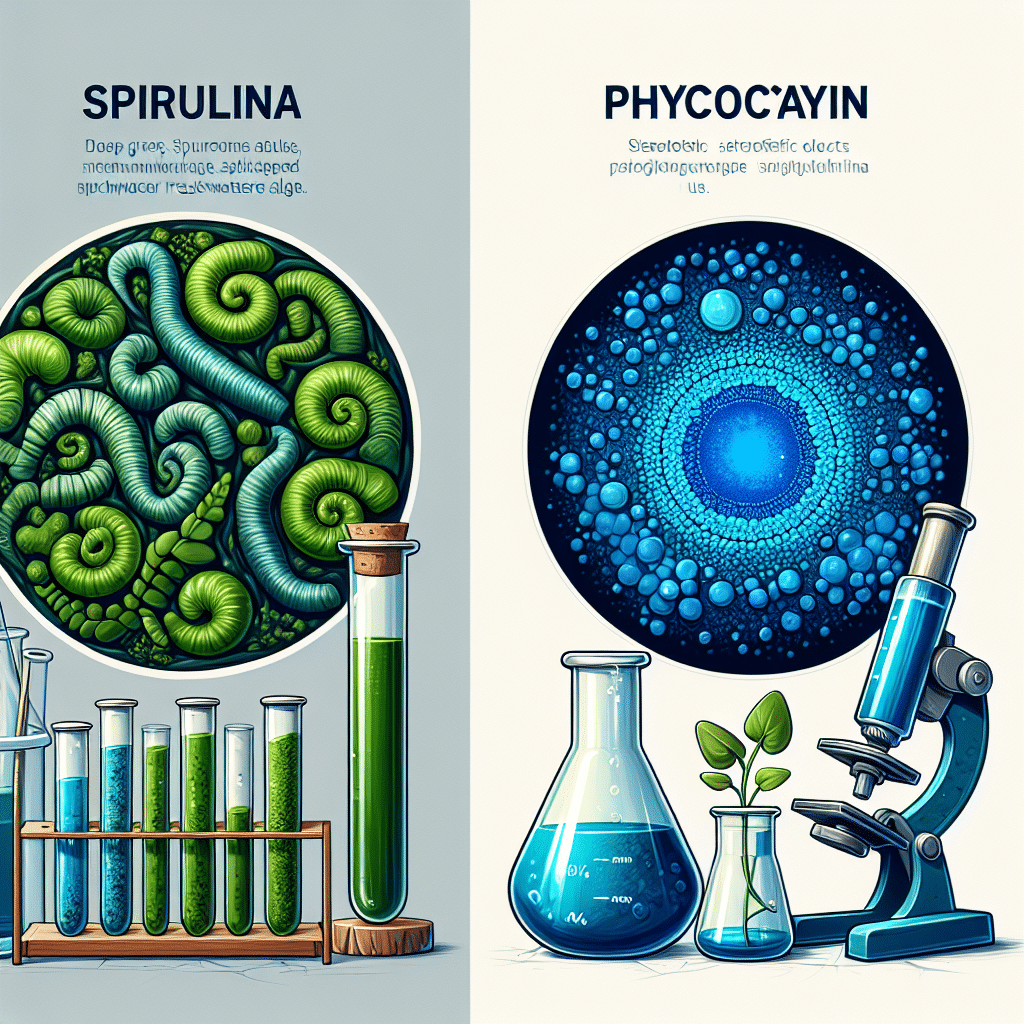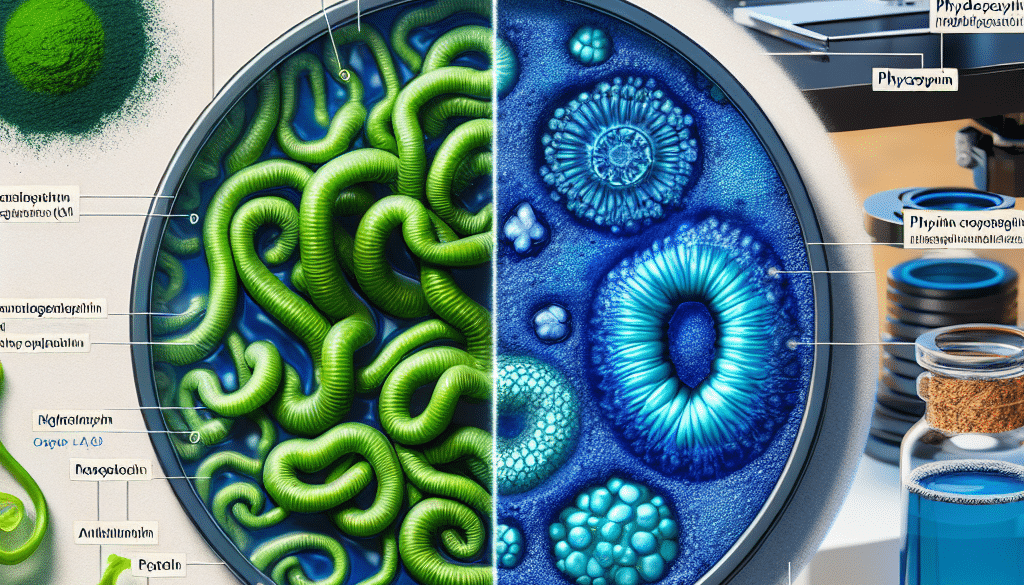What Is The Difference Between Spirulina And Phycocyanin?
-
Table of Contents
- Spirulina vs. Phycocyanin: Understanding the Differences
- What is Spirulina?
- What is Phycocyanin?
- Key Differences Between Spirulina and Phycocyanin
- Health Benefits of Spirulina
- Health Benefits of Phycocyanin
- Applications in Food and Industry
- Case Studies and Research
- Conclusion: Spirulina and Phycocyanin – Complementary Powerhouses
- Discover ETprotein’s High-Quality Protein Products
Spirulina vs. Phycocyanin: Understanding the Differences

When it comes to superfoods, spirulina has been a buzzword in the health and wellness industry for years. Known for its intense blue-green color and impressive nutritional profile, spirulina is often touted as a miracle supplement. However, within spirulina lies a component called phycocyanin, which has gained attention for its unique properties and health benefits. In this article, we will delve into the differences between spirulina and phycocyanin, exploring their characteristics, benefits, and applications.
What is Spirulina?
Spirulina is a type of blue-green algae that grows in both fresh and saltwater. It is a cyanobacterium, which means it is a bacterium that obtains its energy through photosynthesis. Spirulina is rich in nutrients, including proteins, vitamins (especially B12), minerals, and antioxidants. It is commonly consumed as a dietary supplement in powder or tablet form and is used in various health products.
What is Phycocyanin?
Phycocyanin is a pigment-protein complex that is found in spirulina and other cyanobacteria. It is responsible for the distinctive blue color of spirulina and is considered a phycobiliprotein. Phycocyanin has been studied for its antioxidant, anti-inflammatory, and neuroprotective properties. It is extracted from spirulina for use in dietary supplements, natural food colorants, and research applications.
Key Differences Between Spirulina and Phycocyanin
- Nutritional Composition: Spirulina is a whole food and contains a wide range of nutrients, whereas phycocyanin is a single compound with specific health properties.
- Color: Spirulina is known for its blue-green color, while phycocyanin is purely blue.
- Applications: Spirulina is used as a nutritional supplement, while phycocyanin is also used as a natural dye in the food and cosmetics industries.
- Extraction: Phycocyanin is extracted from spirulina, indicating that spirulina is the source material, and phycocyanin is a derivative.
Health Benefits of Spirulina
Spirulina is celebrated for its comprehensive nutritional profile. Here are some of the key health benefits associated with spirulina:
- High in Protein: Spirulina contains about 60-70% protein by weight, which is higher than most plant-based sources.
- Rich in Antioxidants: It contains antioxidants like phycocyanin, beta-carotene, and tocopherols, which help combat oxidative stress.
- Supports Immune Function: Spirulina has been shown to enhance immune response.
- May Lower Cholesterol: Some studies suggest that spirulina can reduce total cholesterol and LDL (bad) cholesterol while increasing HDL (good) cholesterol.
- May Aid in Blood Sugar Control: Spirulina might help manage blood sugar levels, which is beneficial for those with diabetes.
Health Benefits of Phycocyanin
While spirulina as a whole offers numerous health benefits, phycocyanin itself is particularly known for its potent properties:
- Powerful Antioxidant: Phycocyanin scavenges free radicals and protects cells from oxidative damage.
- Anti-inflammatory Effects: It has been shown to reduce inflammation, which is at the root of many chronic diseases.
- Neuroprotective Properties: Research indicates that phycocyanin may protect neurons and could have potential in treating neurodegenerative diseases.
- Supports Liver Health: Phycocyanin may promote liver health and protect against liver damage.
Applications in Food and Industry
Beyond health supplements, both spirulina and phycocyanin have unique applications in various industries:
- Spirulina: It is used as a protein supplement in food and beverages, as well as an ingredient in animal feed.
- Phycocyanin: Due to its vibrant color, it is used as a natural food colorant in candies, desserts, and beverages. It is also used in cosmetics and pharmaceuticals.
Case Studies and Research
Several studies have highlighted the benefits of spirulina and phycocyanin. For instance, a study published in the Journal of Medicinal Food found that spirulina supplementation significantly improved the symptoms of allergic rhinitis. Another study in the journal Antioxidants showed that phycocyanin could protect against oxidative stress in neuronal cells, suggesting potential therapeutic applications for neurodegenerative diseases.
Conclusion: Spirulina and Phycocyanin – Complementary Powerhouses
In conclusion, spirulina and phycocyanin offer a range of health benefits, with spirulina providing a broad spectrum of nutrients and phycocyanin offering specific bioactive properties. Whether consumed as part of spirulina or as an isolated extract, phycocyanin contributes to the overall health-promoting effects of this superfood. Understanding the differences between these two components can help consumers make informed decisions about their health and dietary choices.
Discover ETprotein’s High-Quality Protein Products
If you’re looking to incorporate high-quality protein into your diet, ETprotein offers a range of organic bulk vegan proteins that are non-GMO and allergen-free. Their products, including organic rice protein, pea protein, and various seed proteins, cater to a diverse range of industries. For those interested in the health benefits discussed in this article, ETprotein’s offerings provide an excellent source of plant-based protein to support your nutritional needs.
About ETprotein:
ETprotein, a reputable protein and L-(+)-Ergothioneine (EGT) Chinese factory manufacturer and supplier, is renowned for producing, stocking, exporting, and delivering the highest quality organic bulk vegan proteins and L-(+)-Ergothioneine. They include Organic rice protein, clear rice protein, pea protein, clear pea protein, watermelon seed protein, pumpkin seed protein, sunflower seed protein, mung bean protein, peanut protein, and L-(+)-Ergothioneine EGT Pharmaceutical grade, L-(+)-Ergothioneine EGT food grade, L-(+)-Ergothioneine EGT cosmetic grade, L-(+)-Ergothioneine EGT reference grade and L-(+)-Ergothioneine EGT standard. Their offerings, characterized by a neutral taste, non-GMO, allergen-free attributes, with L-(+)-Ergothioneine purity over 98%, 99%, cater to a diverse range of industries. They serve nutraceutical, pharmaceutical, cosmeceutical, veterinary, as well as food and beverage finished product distributors, traders, and manufacturers across Europe, USA, Canada, Australia, Thailand, Japan, Korea, Brazil, and Chile, among others.
ETprotein specialization includes exporting and delivering tailor-made protein powder and finished nutritional supplements. Their extensive product range covers sectors like Food and Beverage, Sports Nutrition, Weight Management, Dietary Supplements, Health and Wellness Products, and Infant Formula, ensuring comprehensive solutions to meet all your protein needs.
As a trusted company by leading global food and beverage brands and Fortune 500 companies, ETprotein reinforces China’s reputation in the global arena. For more information or to sample their products, please contact them and email sales(at)ETprotein.com today.














